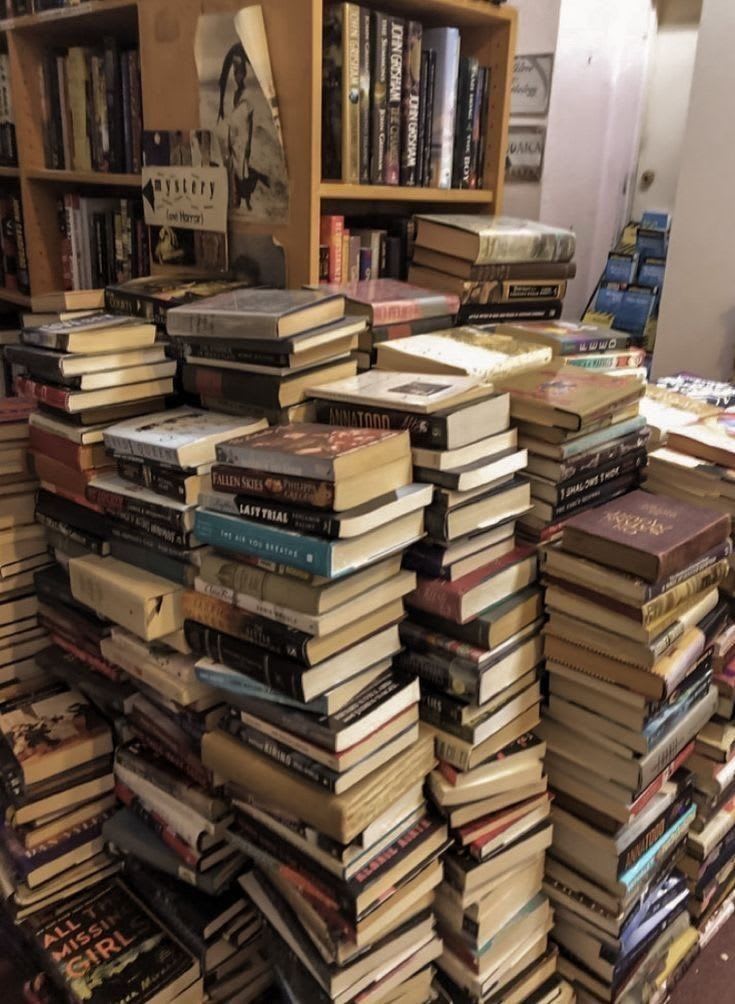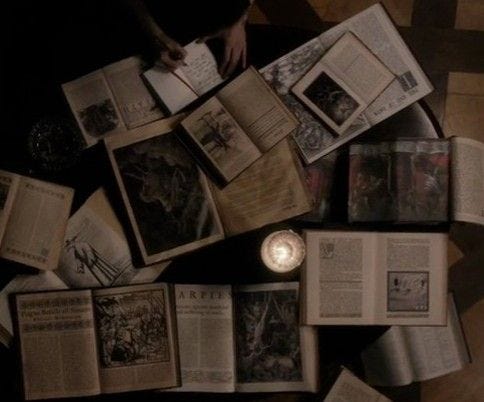hello.
before immersing myself in the booktok world several years ago, i exclusively read nonfiction. despite being an english literature major, i was always of the mind that books needed to be an immersive experience where i would gain life changing, insightful knowledge that would positively impact my life in some way (or it wasn’t worth reading). and for some reason it was embedded in my mind that only nonfiction texts could provide that sort of experience to its readers. at the time, it felt like many of the required reading texts i read throughout high school and college were a waste of time and it was difficult for me to indulge in the pleasure of escapism that literature promises us.
i’ve always been draw to classic literature and philosophy and it took a lot of unlearning and self acceptance to go back to these books and enjoy them the way they were intended. for context, almost everyone in my family made me feel ashamed for choosing to study english in college. i had an advisor once tell me that i should just do english because it’s easy and that i couldn’t possibly handle any other major. when i graduated, i begged my mom not to write my major on the graduation letters she was sending out to distant family and friends, terrified of how they would judge me for not choosing engineering or some other stem route.
truly, an ashamed english graduate.
as you can see, despite the many journals and notebooks i filled to the brim with my writing and despite the many classic literature books i devoured like jane eyre and frankenstein as an early teen, i was very ashamed of who i was and embarrassed that i loved those books and the process of writing so deeply. i had never felt good enough in my family’s eyes or smart enough. it has taken years for me to come back full circle and accept myself and my passions unapologetically, and in turn, dedicate many hours of my day to reading and writing.
all this to say, i’ve learned to enjoy both reading for pleasure and reading for wisdom. many times, books will provide you with both if you let them. over the last several years, i’ve carefully and thoughtfully curated my taste in literature by having a keen sense of awareness of what i find myself naturally gravitating towards. ironically, throughout these years of literary exploration, i found myself right back to my teen years when i really started to fall in love with classic literature and decided expand on this canon with the addition of philosophy books.
for the sake of today’s letter, i’d like to talk about my deep and profound love for philosophy and share some recommendations. i’m aware that many people find these types of books dry or difficult to read, but with the right approach and perspective, these books will have an absolutely profound impact on your life the same way they did for me.
if you were to ask me what my favorite book of all time is, (i have three), i will always answer insufferably, the brothers karamazov by fyodor dostoevsky. this book had the most impact on my life in more ways than one compared to all the other books i’ve ever read.
because diving into dostoevsky or other rich philosophical books can be rather intimidating and daunting, i wanted to share some tips on how to approach this books before i share my recommendations below.
in the ethics of ambiguity by simone de beauvoir, she argues that true freedom is achieved by embracing the ambiguity of human existence, accepting our responsibilities, and recognizing the interconnectedness of our choices with the freedom of others. you can take that same approach with philosophy books. the questions and thoughts and ideologies and theories in these books are not meant to be answered by the reader, but rather, they provide you with the space and time to sit and think about these questions deeply through the lens of ambiguity because we live in a world full of nuance.
if you’re an absolute beginner to philosophy, start with some foundational, accessible texts—some classic options include sophie’s world by jostein gaarder or existentialism is a humanism by jean-paul sartre, which introduce big ideas in digestible ways. it’s okay if you don’t grasp everything right away; again, philosophy is about engaging with questions, not necessarily finding answers. read slowly and actively—take notes, annotate, underline passages that speak to you, and don’t be afraid to pause and reflect on what you’re reading. it helps to discuss ideas with others, or even jot down your thoughts in a journal to process complex concepts. remember, philosophy is meant to be pondered and questioned, not just “solved,” so embrace the ambiguity and trust that the journey itself is where the meaning lies.
i also want to preface that some of these books listed below are philosophy adjacent (like the brothers karamazov and the book of disquiet). also, i’m very aware that there are other iconic and very important philosophy texts out there in the world. i’m simply listing books that have made a profound impact on my life.
philosophy books to read:
the second sex by simone de beauvoir
de beauvoir’s examination of what it means to be a woman is profound and painfully honest, capturing how society systematically defines women as “other.” it reframes womanhood as a social construct rather than a biological given, sparking feminist thought that still feels fresh and challenging today.
the ethics of ambiguity by simone de beauvoir
in this book, de beauvoir wrestles with freedom, ethics, and responsibility, showing that ambiguity is essential to human experience. this is profound to us as readers because she doesn't try to give easy answers—she urges us to live authentically while embracing the inherent uncertainty of existence.
the brothers karamazov by fyodor dostoevsky
arguably one of the most profound books i’ve ever read, this story dives into human nature, faith, and the eternal struggle between good and evil through the complex lives of three brothers. it’s intense and morally probing, forcing readers to confront deep ethical and spiritual questions in ways that feel timeless and universally human.
voice and phenomenon by jacques derrida
derrida takes on phenomenology, language, and consciousness here, focusing on how we experience meaning. the text is rich with radical questioning of what we think we know about language and reality, introducing ideas that challenge conventional philosophy at its core.
fear and trembling by soren kierkegaard
using the story of abraham’s sacrifice, kierkegaard unpacks what it means to have true faith. he forces readers to consider the cost of faith and how it demands a terrifying, absolute trust in something beyond reason or moral understanding. even if you’re not a religious person (i’m not), this book is incredibly profound and sheds light on faith, not just in a spiritual sense, but also within oneself.
the concept of anxiety by soren kierkegaard
kierkegaard explores anxiety as an essential part of human freedom, tied to our limitless potential for choice. he doesn’t view anxiety as something to avoid; instead, he sees it as a driving force for self-discovery and spiritual growth. as a chronically anxious person, this book has been incredibly valuable in regards to perspective whenever i feel myself beginning to spiral.
the book of disquiet by fernando pessoa
this is one of those rare, profoundly introspective books that captures the inner workings of a mind struggling with existence itself. written as a fragmented diary, pessoa’s alter-ego, bernardo soares, reflects on solitude, dreams, and the meaning of life. what makes it so impactful is how deeply it immerses readers in the feeling of disconnection and quiet despair, yet with a strange beauty and clarity. it’s philosophical because it questions everything without ever offering clear answers, making readers confront the vast, often unsettling thoughts they might otherwise ignore. it’s like reading someone’s soul, stripped bare, and it sticks with you because it feels achingly honest and universal.
the sublime object of ideology by slavoj zizek
zizek blends psychoanalysis, marxism, and pop culture to explore how ideology shapes our desires and perceptions. it’s compelling because it doesn’t just critique ideology; it digs into why we’re drawn to it, revealing the psychological power it has over us.
the myth of sisyphus by albert camus
camus’ essay on the absurd focuses on how we find meaning in a meaningless world, using sisyphus as a metaphor for human resilience. it’s deeply moving because it embraces life’s futility and argues that our struggle itself is what gives us purpose. this is one of my favorite books by camus. i’ve lived a sisyphusean existence for the large majority of my life. this book was incredibly eye opening.
being and time by martin heidegger
heidegger’s exploration of “being” dives into the essence of human existence and our relationship to time. it’s impactful because it challenges us to think about life not just as a sequence of events but as something more fundamental, a deeply personal journey toward authenticity.
aphorisms on love and hate by friedrich nietzsche
this short collection offers nietzsche’s sharp, often brutal insights on human nature. its unapologetic honesty, making readers confront the raw, sometimes harsh realities of love, hate, and the complexities of human emotion.
being and nothingness by jean-paul sartre
sartre’s existentialist masterpiece examines freedom, responsibility, and consciousness, arguing that existence precedes essence. it forces readers to confront their own freedom and the “nothingness” at the heart of identity, challenging us to create our own meaning.
nausea by jean-paul sartre
this novel follows a man’s existential crisis as he grapples with the meaninglessness of existence. this book captures the unsettling, almost physical feeling of being confronted with pure existence, leaving readers with a profound sense of existential weight.
existentialism is a humanism by jean-paul sartre
in this lecture, sartre defends existentialism, emphasizing that humans are free to define themselves through their actions. it insists on personal responsibility and agency, encouraging readers to embrace freedom as a way of shaping their lives. this is a great philosophy book to start with if you’re new to the genre.
the burnout society by byung-chul han
han critiques modern society’s obsession with productivity and self-optimization, showing how it leads to exhaustion and a loss of true connection. it speaks directly to the pressures of contemporary life, where we’re constantly pushed to do more, often at great personal cost.
sophie’s world by jostein gaarder
this novel introduces readers to philosophy through the eyes of a young girl exploring life’s big questions. it’s impactful because it makes complex philosophical ideas accessible and engaging, sparking curiosity and a sense of wonder about the world and our place in it. i read this book when i was a teenager and dare i say, this is what sparking my initial interest in philosophy.
i hope you’re able to find a book or two (or three) in this list that captures your interest. i promise you that investing your energy and time into philosophy will deeply enrich your mind and outlook on life and the world around you.
okay, that’s all for today.
if you’re not ready to become a paid subscriber and you have the capacity to leave a tip, that would be so appreciated.
i love you.
bye.









Do you have good philosophy book recommendations that are easier reads for beginners? I can read classics without too many hurdles but a lot of philosophy books are kinda dry and my brain can't focus for too long.
thank you so much for this comprehensive list and for mostly, making a list that can be referred to- as a beginner, or someone who’s a regular. Deeply appreciate you!! xx